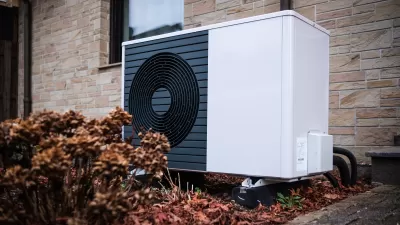Just in time for winter, the U.S. Department of Energy released a standard to make heating and cooling in commercial buildings far more efficient, increasing minimum efficiency by 10 to 25 percent.
On Dec. 17, the Department of Energy (DOE) released an energy rule that "is described as the 'largest energy-saving standard in history' and one that 'will save more energy than any other standard issued by the Department to date' — a standard governing commercial air conditioners and furnaces," writes Chris Mooney, who reports on energy and the environment at The Washington Post.
Depending on the type of air conditioning and heating equipment, compliance dates range from 2018 to 2023, according to the proposed rule [see pages 10-11 of PDF].
The standards contained in the recommendations apply to all equipment listed in Table I-1 manufactured in, or imported into, the United States starting on the dates shown in that table.
The new standards are noteworthy not only for the energy they will save and the emissions they will reduce, but the collaborative process that established them.
“These standards are a game-changer for the commercial sector,” said Steve Nadel, executive director of the American Council for an Energy-Efficient Economy. “Industry and advocates worked closely together to help produce the biggest energy savings standards in US history."
"Based on DOE’s estimates, the new rooftop air conditioner standards will save more energy and cut more emissions than any other standards completed by the agency, outpacing the previous record-setters that covered electric motors (2014) and fluorescent tube lamps (2009)," states the ACEEE press release.
DOE estimates that the new standards will save businesses as much as $50 billion in energy costs. DOE also set standards for commercial warm air furnaces, which are typically installed with the rooftop commercial air conditioners.
The rooftop air conditioner standards will take effect in two phases, increasing minimum efficiency by about 10% as of January 1, 2018, and by 25–30% as of January 1, 2023. Standards for new warm air furnaces that are typically installed as a unit with a commercial air conditioner also become effective in 2023.
Energy Secretary Ernest Moniz also noted in a press release the timing of the landmark energy efficiency standard with the new climate accord that 195 nations agreed to on December 12.
“Just days after the Paris agreement to cut global emissions and create a new era of affordable energy, today’s (Dec. 17) announcement marks the largest energy-saving standard in history and demonstrates that America is leading the effort to reduce energy costs and cut carbon emissions,” said Moniz.
FULL STORY: Energy and Environment: Obama just released the biggest energy efficiency rule in U.S. history

Maui's Vacation Rental Debate Turns Ugly
Verbal attacks, misinformation campaigns and fistfights plague a high-stakes debate to convert thousands of vacation rentals into long-term housing.

Planetizen Federal Action Tracker
A weekly monitor of how Trump’s orders and actions are impacting planners and planning in America.

In Urban Planning, AI Prompting Could be the New Design Thinking
Creativity has long been key to great urban design. What if we see AI as our new creative partner?

How Trump's HUD Budget Proposal Would Harm Homelessness Response
Experts say the change to the HUD budget would make it more difficult to identify people who are homeless and connect them with services, and to prevent homelessness.

The Vast Potential of the Right-of-Way
One writer argues that the space between two building faces is the most important element of the built environment.

Florida Seniors Face Rising Homelessness Risk
High housing costs are pushing more seniors, many of them on a fixed income, into homelessness.
Urban Design for Planners 1: Software Tools
This six-course series explores essential urban design concepts using open source software and equips planners with the tools they need to participate fully in the urban design process.
Planning for Universal Design
Learn the tools for implementing Universal Design in planning regulations.
Gallatin County Department of Planning & Community Development
Heyer Gruel & Associates PA
JM Goldson LLC
City of Camden Redevelopment Agency
City of Astoria
Transportation Research & Education Center (TREC) at Portland State University
Jefferson Parish Government
Camden Redevelopment Agency
City of Claremont





























